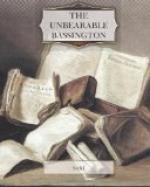have carried weight with her in judging any man; in
this case its value was enormously heightened by contrast
with the behaviour of her other wooer. And Youghal
had in her eyes the advantage which the glamour of
combat, even the combat of words and wire-pulling,
throws over the fighter. He stood well in the
forefront of a battle which however carefully stage-managed,
however honeycombed with personal insincerities and
overlaid with calculated mock-heroics, really meant
something, really counted for good or wrong in the
nation’s development and the world’s history.
Shrewd parliamentary observers might have warned
her that Youghal would never stand much higher in the
political world than he did at present, as a brilliant
Opposition freelance, leading lively and rather meaningless
forays against the dull and rather purposeless foreign
policy of a Government that was scarcely either to
be blamed for or congratulated on its handling of
foreign affairs. The young politician had not
the strength of character or convictions that keeps
a man naturally in the forefront of affairs and gives
his counsels a sterling value, and on the other hand
his insincerity was not deep enough to allow him to
pose artificially and successfully as a leader of men
and shaper of movements. For the moment, however,
his place in public life was sufficiently marked out
to give him a secure footing in that world where people
are counted individually and not in herds. The
woman whom he would make his wife would have the chance,
too, if she had the will and the skill, to become
an individual who counted.
There was balm to Elaine in this reflection, yet it
did not wholly suffice to drive out the feeling of
pique which Comus had called into being by his slighting
view of her as a convenient cash supply in moments
of emergency. She found a certain satisfaction
in scrupulously observing her promise, made earlier
on that eventful day, and sent off a messenger with
the stipulated loan. Then a reaction of compunction
set in, and she reminded herself that in fairness
she ought to write and tell her news in as friendly
a fashion as possible to her dismissed suitor before
it burst upon him from some other quarter. They
had parted on more or less quarrelling terms it was
true, but neither of them had foreseen the finality
of the parting nor the permanence of the breach between
them; Comus might even now be thinking himself half-forgiven,
and the awakening would be rather cruel. The
letter, however, did not prove an easy one to write;
not only did it present difficulties of its own but
it suffered from the competing urgency of a desire
to be doing something far pleasanter than writing
explanatory and valedictory phrases. Elaine
was possessed with an unusual but quite overmastering
hankering to visit her cousin Suzette Brankley.
They met but rarely at each other’s houses and
very seldom anywhere else, and Elaine for her part
was never conscious of feeling that their opportunities




